Ken BanksNorth east Scotland reporter, Stonehaven
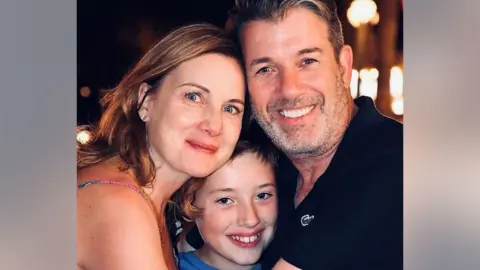 Hutchinson family
Hutchinson familyArlene Hutchinson’s husband, Mark, was only 52 when he died unexpectedly last year after suffering two strokes “out of the blue”.
Like many couples they had never discussed organ donation but she knew it was what he would have wanted.
Now Arlene and son Jack, 12, take comfort in the knowledge that Mark has helped transform the lives of others.
She said: “He lives on in four people. That can only be a good thing.”
Arlene and Jack, who live near Stonehaven in Aberdeenshire, hope that their story encourages people to speak about the sensitive subject before it is too late.
They also want to raise awareness about strokes.
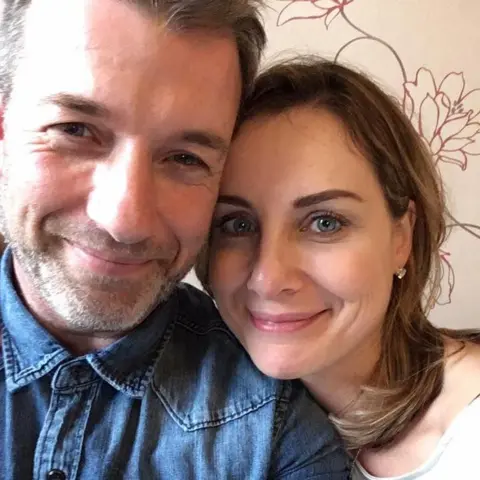 Hutchinson family
Hutchinson familyArlene, 51, who works in marketing, met Mark in 2004.
He worked in behavioural health and safety but they did not become a couple until 2007.
Arlene described him as the love of her life and they married in New York in 2010.
Jack was born two years later and they were soon joined by pet dog, Luna.
She recalled: “We had a really happy life together, the three of us.”
Arlene said they had a “healthy” family lifestyle.
The couple were non-smokers, ate well and enjoyed taking Luna for walks.
But last summer their lives were suddenly turned upside down.
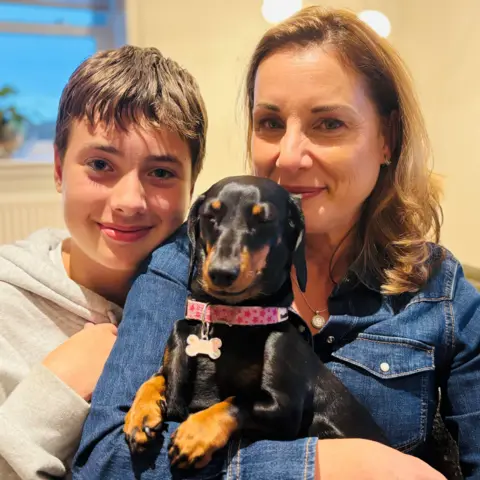
Arlene and Jack took the dog for a walk while Mark was in the shower getting ready for a family event.
When they got back, Arlene said Mark was emotional.
“He told me he was not feeling right at all, and had fallen,” she said. “He just wasn’t himself. And he had a numb tongue.”
Mark’s speech started to go, and one side of his face drooped – classic stroke symptoms.
“It was very, very distressing,” she said.
They tried to keep him calm while they waited for an ambulance.
After arriving in hospital, Arlene was told her husband had a blood clot in the brain but was still conscious and sitting up.
She said there was “fear” in Mark’s eyes, and he was taken to the stroke ward.
Over the coming days, the talk was of recovery.
But Mark then suffered a second stroke and lost consciousness.
Arlene said she “still had hope” as they waited for scan results, but they revealed the “devastating” news that Mark’s brain had been left severely damaged.
“There was not any good outcome,” she said.
“I knew Mark would never want to be like that – where he just could not do anything for himself.
“I will never have to do anything as hard as tell Jack.”
As Arlene came to terms with the news she spoke to the donor team.
‘Recipient’s life has changed’
She said: “We decided that was what we would like to do.
“Mark was going to die. I felt it was an easy decision for me to make.
“Knowing the person Mark was, I know that he would have wanted this wholeheartedly to help others.”
He died two days later, and was taken to theatre.
Arlene said: “The amazing specialist organ donation team stepped in.
“They cared for Mark and my family with so much dignity and respect.
“They were with us during our darkest moments and when Mark passed away.
“The team found four recipients for Mark’s organs, and we have amazingly since heard from one recipient whose life has completely changed since gaining two kidneys from Mark.”
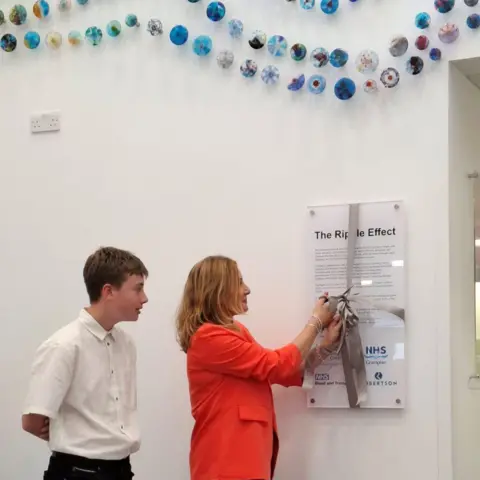 NHS Grampian
NHS GrampianArlene and Jack recently unveiled an art installation at Aberdeen Royal Infirmary which pays tribute to organ donors.
Artist Shelagh Swanson was commissioned to work with the relatives of donors, along with young people at more than a dozen secondary schools, to create the ripple-effect art.
Workshops were held with secondary school pupils across Aberdeen, and in Aberdeenshire in Stonehaven, Kemnay, Huntly, Inverurie and Peterhead.
Arlene said she was honoured to unveil the artwork and added: “I am in awe of what the small but dedicated organ donation team achieve and will be forever grateful to them.”
What is the law on organ donation in Scotland?
Everyone in Scotland became an automatic organ donor from 2021 under new laws, unless they opt out.
Under the previous system, more than half of Scotland’s population were registered to donate their organs or tissue after their death.
It is now presumed that people have consented to donation unless they have stated otherwise.
There are some exemptions, including children under the age of 16, and adults who lack the capacity to understand the new law – for example those with dementia.
The aim is that more people can be given life-saving and life-changing transplants.
People who do not want their organs to be donated for a transplant can opt out through the Organ Donation Scotland website.
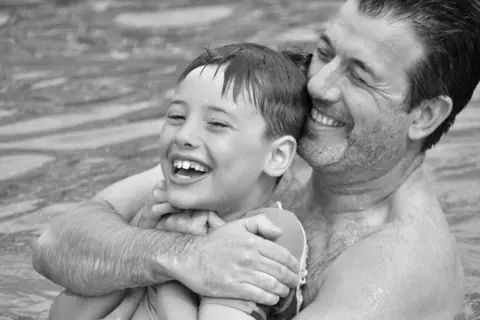 Hutchinson family
Hutchinson familyArlene said her husband “just wanted to spread joy”.
She added: “He was caring, a big softie. He had a massive smile on his face all the time. He was such a happy man.”
Reflecting on his loss, she said: “We will never know why as it was completely out the blue.
“It’s been over a year and every day is hard. All of this has changed our lives.”
Jack, now 13, described his dad as “always upbeat, joyful”.
He said: “He was a lot of fun, always doing silly things to make us laugh. He would always wind us up.”
Asked how he felt about his father’s organs ultimately helping four other people, Jack replied: “It’s a comfort.
“I am very proud.”

